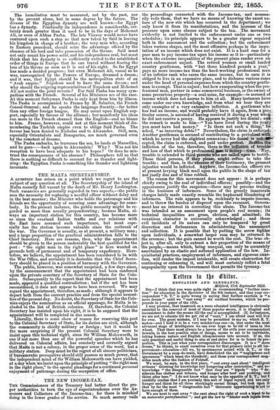THE MALTA SECRETARYSHIP.
A QUESTION has arisen on a point which we regret to see the subject of any question at all. The Secretaryship of the island of Malta recently fell vacant by the death of Mr. Henry Lushington. Such vacancies are generally regarded in two aspects,—the public sees the necessity for replacing a needful officer without delay and in the best manner ; the Minister who holds the patronage and his friends see the opportunity of securing some advantage for some- body. In the present instance, the public necessity might be re- garded as more than usually preponderating; because Malta, al- ways an important station for this country, has become more so since the overland Indian traffic and our relations with the East have assumed such importance, but most espe- cially has the station become valuable since the outbreak of the war. The Governor is usually, as at present, a military man; and a large proportion of the practical administration falls to the Chief Secretary. Here are reasons, then, why the appointment should be given to the person undeniably the best qualified for the post : "the right man in the right place" is here wanted on grounds both of permanent and of temporary expediency. Here- tofore, we believe, the appointment has been considered to be with the War Office, and certainly it is desirable that the Chief Secre- tary should be placed in a position of harmony with the Governor.
The public, however, was somewhat surprised, a few days since, by the announcement that the appointment had been conferred upon the private secretary of the Secretary of State for the Colo- nies. Subsequently to the report that the appointment had been made, appeared a qualified contradiction ; but if the act has been reconsidered, it does not appear to have been reversed. We may regard the appointment, therefore, as made ; although it appears to depart both from the current practice and from the special necessi- ties of the present day. No doubt, the Secretary of State for the Colo- nies enjoys the nomination as an official appanage, for Malta is in- cluded in the list of British colonies. If, therefore, the Colonial Secretary has insisted upon his right, it is to be supposed that the appointment will be completed in due season.
Literally, there is some show of reason for reserving this post to the Colonial Secretary of State, for its duties are civil, although the community is chiefly military or foreign ; but it would be the more surprising if the present Colonial Secretary were to insist upon this technical right, since Sir William Molesworth, in one if not more than one of the powerful speeches which he has delivered on Colonial affairs, has concisely and correctly argued that Malta is not a colony, in the proper sense of the word, but a military station. Deep must be the regret of all sincere politicians, if bureaucratic prerogative should still possess so much power, that the independent mind of Sir William Molesworth can have yielded, at a day when we insist upon the principle of putting "the right man in the right place," to the special pleadings for a continued personal enjoyment of patronage during the occupation of office.


























 Previous page
Previous page